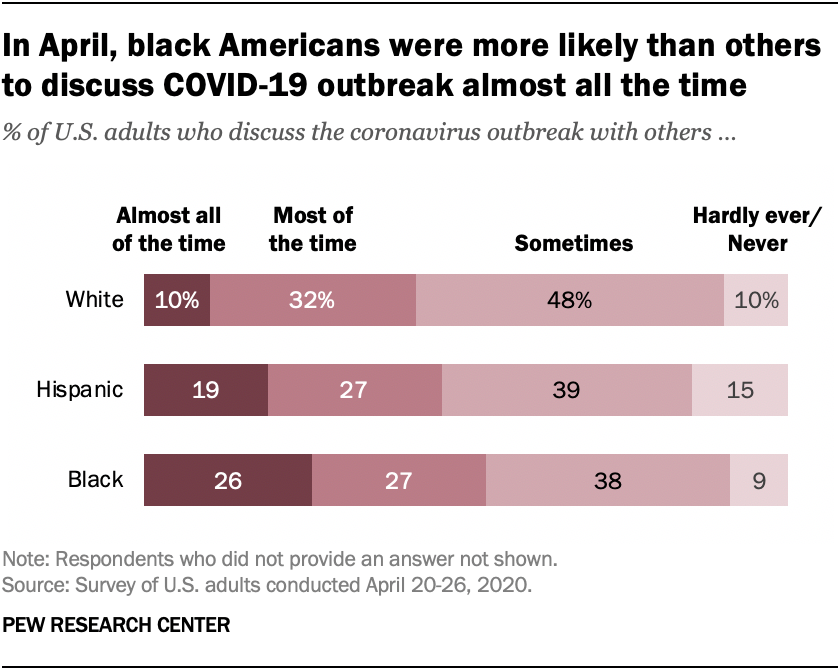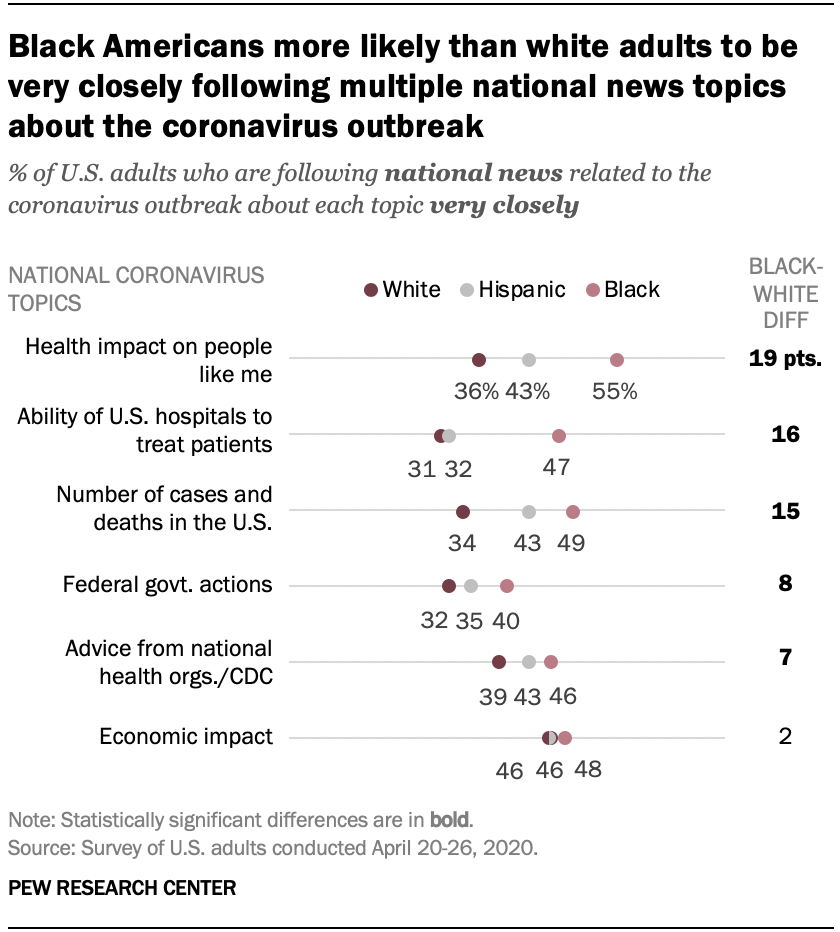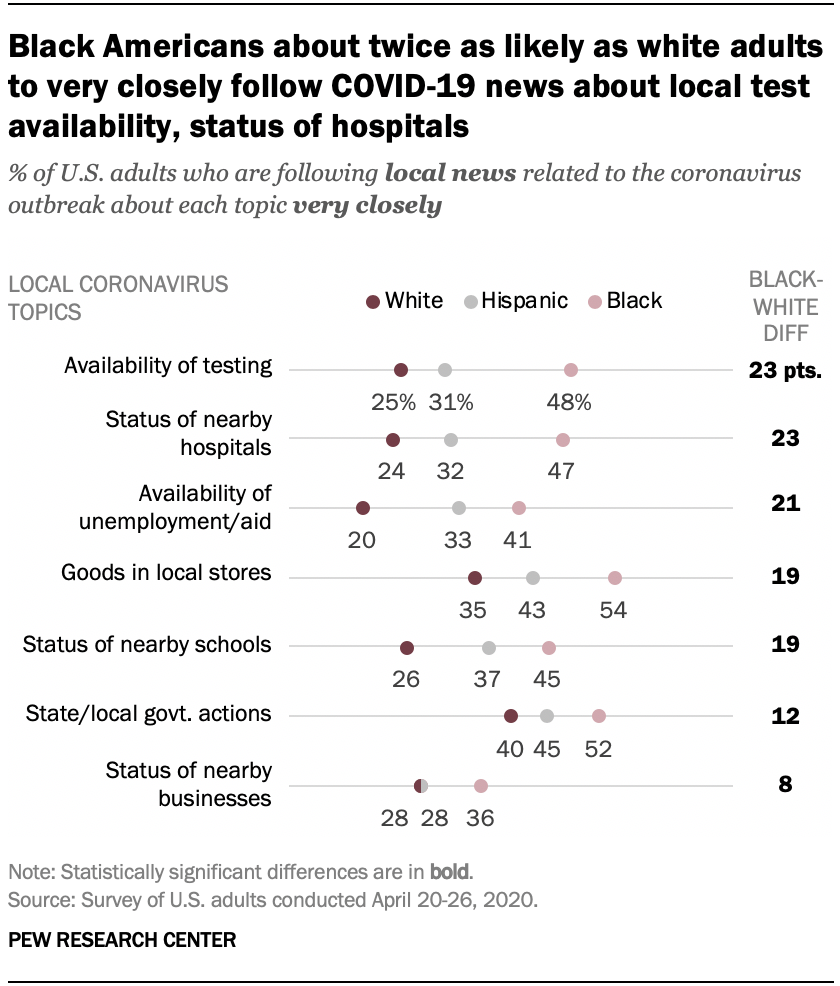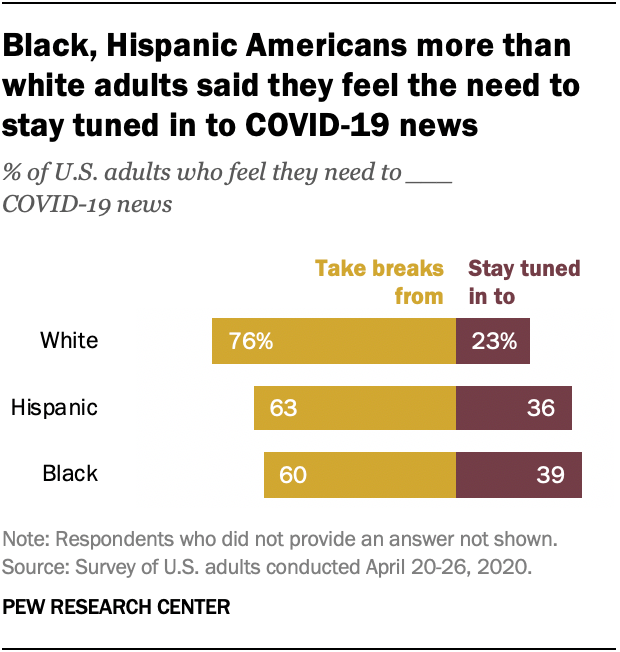Black Americans, a group that has been hit disproportionately hard by the coronavirus outbreak, have been paying closer attention to many elements of the outbreak – and discussing it more frequently with other people – than other U.S. adults, according to a Pew Research Center survey conducted before nationwide protests began over the death of George Floyd in Minneapolis.

Many Americans have been following news about the coronavirus outbreak very closely, including 50% of black adults, 46% of white adults and 43% of Hispanic adults, according to the survey, conducted April 20-26, 2020, as part of the Center’s American News Pathways project.
But black adults were much more likely than whites and somewhat more likely than Hispanic adults to frequently discuss the COVID-19 outbreak with other people. Roughly a quarter (26%) of black adults said they discuss it almost all the time, more than twice the 10% of white adults who said the same, and more than the 19% of Hispanic adults who said the same.
How we did this
This analysis of how black Americans follow many coronavirus topics more closely than white and Hispanic Americans is based on a survey of 10,139 U.S. adults conducted April 20-26, 2020. Everyone who took part in the survey is a member of Pew Research Center’s American Trends Panel, an online survey panel that is recruited through national, random sampling of residential addresses.
Recruiting our panelists by phone or mail ensures that nearly all U.S. adults have a chance of selection. This gives us confidence that any sample can represent the whole population (see our Methods 101 explainer on random sampling). To further ensure that each survey reflects a balanced cross section of the nation, the data is weighted to match the U.S. adult population by gender, race, ethnicity, partisan affiliation, education and other categories.
Here are the questions asked for this survey, along with responses, and its methodology.
What black Americans are discussing with others about the outbreak may be influenced by the topics of the outbreak they follow. Of 13 COVID-related topics asked about in the survey — both national and local — black Americans were more likely than white and Hispanic adults to be very closely following most of them. That gap in interest is particularly pronounced between black and white respondents.
At the national level, 55% of black adults said they were very closely following news about the health impact of the COVID-19 outbreak on people like them, substantially more than the 36% of white adults and the 43% of Hispanic adults who do so.

Similarly, about half of black Americans (49%) were very closely following news about the number of COVID-19 cases and deaths in the United States, higher than the 34% of white adults who said the same (and about on par with the 43% of Hispanic adults who said the same). And while 47% of black Americans were very closely following news about the ability of hospitals across the country to treat patients, those numbers drop to 31% of white and 32% of Hispanic Americans.
There are somewhat more modest differences on several national topics. For example, 46% of black Americans said they were very closely following news regarding advice from national health organizations, compared with 39% of white adults (43% of Hispanic adults follow this topic very closely, about on par with black adults). Additionally, 40% of black respondents were very closely following news about the actions and statements of the federal government, higher than 32% of white adults. There is virtually no difference among the three groups when it comes to very closely following news about the economic impact of the outbreak.
There are more gaps when it comes to local coronavirus topics. Black respondents were more likely than those in the other two racial and ethnic groups to keep a very close eye on all seven topic areas asked about.

About half (48%) of black adults were very closely following local news about the availability of COVID-19 tests, nearly twice the share of white adults (25%) and higher than the 31% of Hispanic adults. A similar portion of black Americans (47%) said they were very closely following the status of nearby hospitals – again about twice the percentage as white adults (24%) and also substantially higher than the share among Hispanic adults (32%).
News about the availability of food and other local goods was also more closely tracked by black Americans (54% follow it very closely) than by white (35%) or Hispanic adults (43%). And about four-in-ten black adults (41%) said they are very closely following local news related to the availability of unemployment benefits and other aid, compared with two-in-ten white adults and a third of Hispanics.

Both black and Hispanic respondents were more likely than whites to say they feel they need to stay tuned in to news about the coronavirus outbreak. Roughly four-in-ten black adults said this (39%), as did 36% of Hispanics. Around a quarter of white adults (23%) said the same. Still, majorities in all three groups said they need to take breaks from this news from time to time (76% of white, 63% of Hispanic and 60% of black adults).
Note: You can find all of the data from this analysis in this interactive tool. Here are the questions asked for this survey, along with responses, and its methodology.